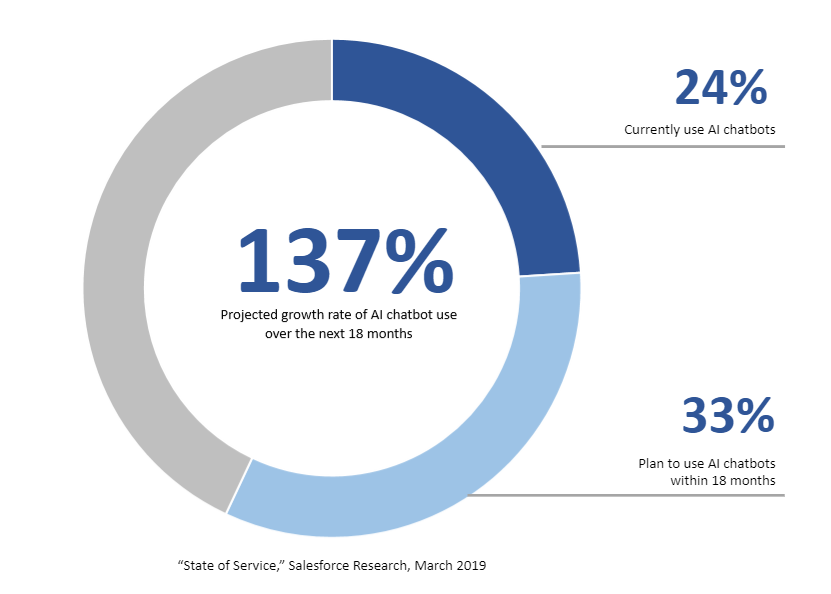The Role of Einstein Bots in Manufacturing
In part three in the series “The Art of the Possible: Manufacturing,” let’s explore use cases Chatbots and AI for manufacturing.
The manufacturing industry is well-positioned to take advantage of AI enabled chatbot functionality. According to a recent Salesforce “State of Service” report, 24% of manufacturing customer service professionals currently use AI chatbots with 33% planning to use them in the next 18 months. The projected growth rate of AI chatbot use in the manufacturing industry over the next 18 months is 137%.

When you think about chatbots, the first thing that comes to mind is likely an online customer service agent that engages with customers. While this is an excellent application for chatbots, there are many more ways that manufacturing can make use of this evolving technology. Because a key goal in manufacturing is to produce and deliver a quality product with minimal delay, the ability to keep employees up-to-date on all stages of the production supply chain is imperative. Employees, just like consumers, expect to have access to the information they need in real-time. Chatbots are able to respond to this need by providing answers to employee inquiries at any time of the day from any location. But first, what exactly are chatbots?
What are Salesforce Einstein Bots?
A chatbot is a generic term for an application powered by Artificial Intelligence (AI) that simulates a real-time conversation in the user’s natural language. The Salesforce Einstein Bot functionality harnesses the power of AI to interact with users on virtually any channel. With Einstein Bots, it’s possible to provide users with the answers they need quickly using Natural Language Processing (NLP) combined with any type connected data including CRM and ERP systems. Einstein Bots can be deployed on a traditional online web chat platform, SMS, Facebook Messenger, Apple Business Chat, and more. With chatbots, businesses can expect to reduce in-person call volume and average call handle time while simultaneously increasing first contact resolution, agent productivity, employee morale, and customer satisfaction. In addition to Einstein Bots, Salesforce also offers Einstein Voice functionality that allows customers to interact with their data through a voice-powered app.
While the applications for AI enabled chatbots are numerous, we have highlighted several use cases below specific to the manufacturing industry. These applications address the industry-wide challenges we encounter in our clients related to budgetary constraints, maintaining visibility into end-to-end processes, and keeping up with consumer and vendor expectations.
Supply and Inventory Status
Factory managers need to stay up-to-date on the status of parts and materials inventory. This allows them to know the right time to submit a request to order additional supplies. Traditionally, a manager might open a report on a desktop application in their office to determine (for example) how many types of widgets can be manufactured based on existing supply inventory. Instead of opening a static report on a computer, the manager could simply use a chatbot on a mobile device and type or speak a question directly. The chatbot will respond with the number of widget types that could be manufactured based on existing inventory.
Safety and Maintenance Inquiries
In a manufacturing plant, accidents are not only damaging to employee health and productivity, but can also cause tremendous financial loss. Thus, it’s important to be able to monitor and assess the safety of each factory’s work environment in real-time. Again, managers and maintenance crews can check and log safety issues in traditional reports. However with chatbots, they can ask specifically about facility metrics and make immediate adjustments to building temperatures, gauges, and equipment as necessary while they are on the factory floor. This ensures that managers can monitor and respond to issues in the most efficient way possible.
Internal Human Resources
Every company is expected to manage HR activities including recruitment and people management for existing employees. The manufacturing industry is no different. AI enabled chatbots allow HR professionals to gather instant information about employee performance, progress reviews, and attendance from any location. Chatbots are also effective during the recruitment process as a way for prospective employees to schedule interviews, engage in screening exercises, and event have questions answered.
End-to-End Visibility
Because of the complexities of modern agile supply chains, AI enabled chatbots can be a valuable asset in providing end-to-end visibility. Where a manager might struggle in interpreting reports to predict inventory levels or set delivery dates, a chatbot powered can be trained to interpret data from multiple sources and provide clear and actionable answers. Managers and buyers can also ask questions directly to chatbots to determine order status to get information about the status of shipments directly from their mobile devices.
Recalls and Customer Interactions
Recalls are costly not only to manufacturing operations, but also in terms of responding to consumer inquiries. Chatbots enable a streamlined way for consumers to contact manufacturers directly and receive answers about recalls without straining the resources of live agents. This allows chatbots to handle routine questions while allowing live agents to respond to more complex inquiries.
As the applications for chatbots in the manufacturing industry continue to grow, so do their benefits of meeting increasing demands for self-service needs, providing instant responses to complex questions, reductions in human error, and improvements in ROI for manufacturing efforts as a whole. AI enabled chatbots are just another tool that will eventually become standard for all manufacturers as they strive for greater operational efficiencies to meet performance goals.



